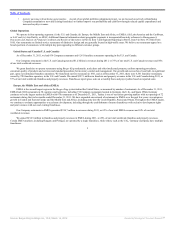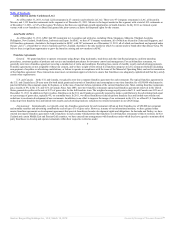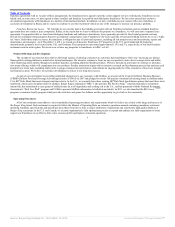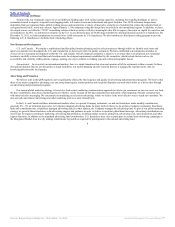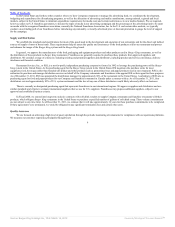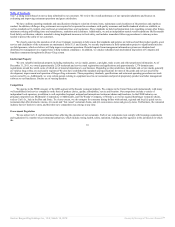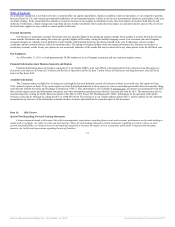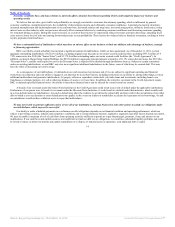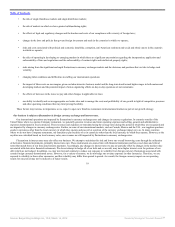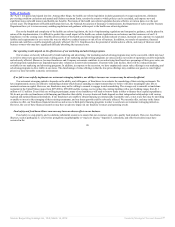Burger King 2011 Annual Report Download - page 16
Download and view the complete annual report
Please find page 16 of the 2011 Burger King annual report below. You can navigate through the pages in the report by either clicking on the pages listed below, or by using the keyword search tool below to find specific information within the annual report.
Table of Contents
capital or restructure or refinance our indebtedness, including the notes. We may not be able to affect any such alternative measures on commercially reasonable
terms or at all and, even if successful, those alternative actions may not allow us to meet our scheduled debt service obligations. The Senior Notes Indenture and
the Credit Agreement restrict our ability to dispose of assets and use the proceeds from those dispositions and also restrict our ability to raise debt or equity
capital to be used to repay other indebtedness when it becomes due. We may not be able to consummate those dispositions or to obtain proceeds in an amount
sufficient to meet any debt service obligations then due.
In addition, we conduct a substantial portion of our operations through our subsidiaries. Accordingly, repayment of our indebtedness is dependent on the
generation of cash flow by our subsidiaries and their ability to make such cash available to us, by dividend, debt repayment or otherwise. Our subsidiaries do not
have any obligation to pay amounts due on our indebtedness (unless they are guarantors thereof) or to make funds available for that purpose. Our subsidiaries
may not be able to, or may not be permitted to, make distributions to enable us to make payments in respect of our indebtedness. Each subsidiary is a distinct
legal entity, and, under certain circumstances, legal and contractual restrictions may limit our ability to obtain cash from our subsidiaries. While the Senior Notes
Indenture and the agreements governing certain of our other existing indebtedness limit the ability of our subsidiaries to incur consensual restrictions on their
ability to pay dividends or make other intercompany payments to us, these limitations are subject to qualifications and exceptions. In the event that we do not
receive distributions from our subsidiaries, we may be unable to make required principal and interest payments on our indebtedness.
Our franchise dominated business model presents a number of disadvantages and risks.
We have a higher percentage of franchise restaurants to Company restaurants than our major competitors in the FFHR category, and we expect the number
of franchise restaurants to increase as we continue to implement our growth plans. Our highly franchised business model presents a number of drawbacks, such
as our limited influence over franchisees and reliance on franchisees to implement major initiatives, limited ability to facilitate changes in restaurant ownership,
limitations on enforcement of franchise obligations due to bankruptcy or insolvency proceedings and inability or unwillingness of franchisees to participate in our
strategic initiatives. For example, our success in executing one of our key strategies (reimaging our restaurants base) will depend on the ability and willingness of
our franchisees to reinvest in remodeling or rebuilding their restaurants. As part of our global portfolio realignment project, we intend to increase the number of
franchised restaurants; therefore, the problems associated with these drawbacks may be exacerbated and may present a significant challenge for management.
Our principal competitors may have greater influence over their respective restaurant systems than we do because of their significantly higher percentage
of Company restaurants and/or ownership of franchisee real estate. McDonald’s and Wendy’s have a higher percentage of Company restaurants than we do, and,
as a result, they may have a greater ability to implement operational initiatives and business strategies, including their marketing and advertising programs.
Franchisee support of our marketing and advertising programs is critical for our success.
The support of our franchisees is critical for the success of our marketing programs and any new capital intensive or other strategic initiatives we seek to
undertake, and the successful execution of these initiatives will depend on our ability to maintain alignment with our franchisees. While we can mandate certain
strategic initiatives through enforcement of our franchise agreements, we need the active support of our franchisees if the implementation of these initiatives is to
be successful. In addition, our efforts to build alignment with franchisees may result in a delay in the implementation of our marketing and advertising programs
and other key initiatives. Our franchisees may not continue to support our marketing programs and strategic initiatives. The failure of our franchisees to support
our marketing programs and strategic initiatives could adversely affect our ability to implement our business strategy and could materially harm our business,
results of operations and financial condition.
15
Source: Burger King Holdings Inc, 10-K, March 14, 2012 Powered by Morningstar® Document Research℠


